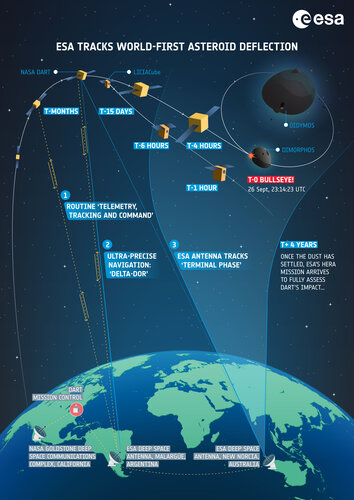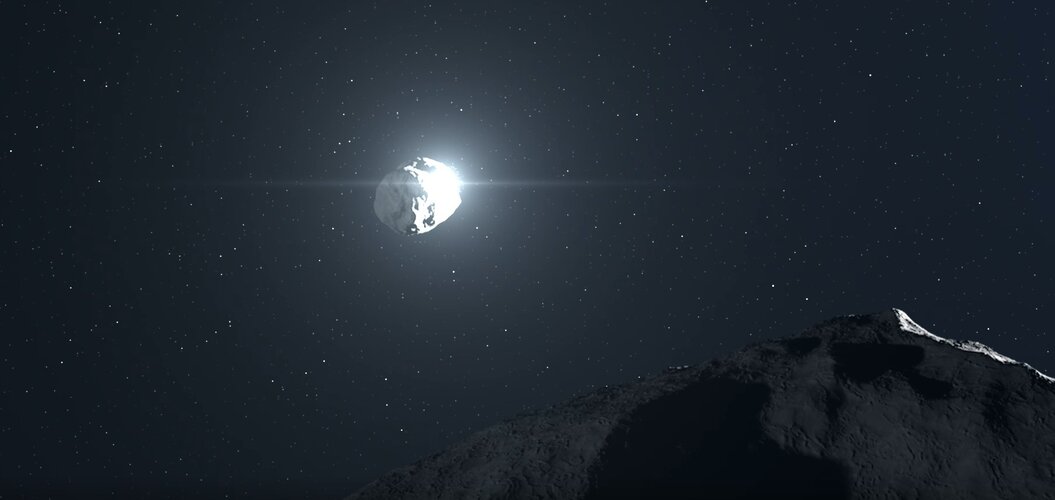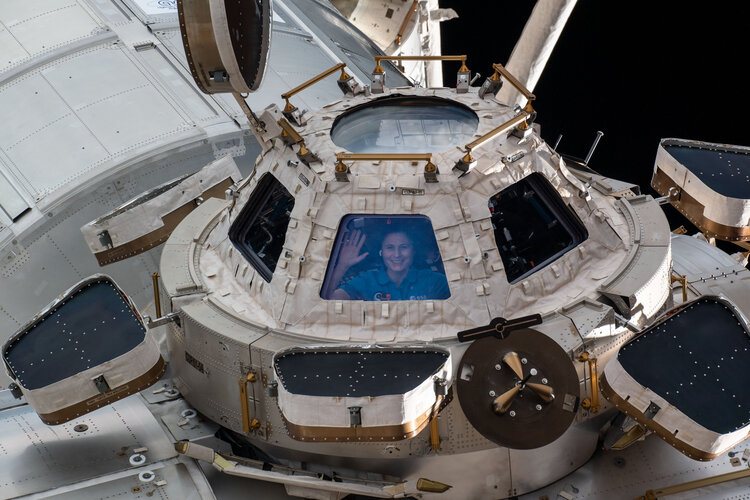
Copernical Team
Tuesday, 20 September 2022 10:00
ESA tracks world-first asteroid deflection
 Image:
ESA's Estrack network tracks DART in the vital moments before asteroid impact
Image:
ESA's Estrack network tracks DART in the vital moments before asteroid impact
Published in
News
Tagged under
Tuesday, 20 September 2022 12:08
SpaceX wants to bring satellite internet to Iran: Musk
Washington (AFP) Sept 20, 2022
 SpaceX will apply for an exemption from US sanctions against Iran in a bid to offer its satellite internet service to the country, owner Elon Musk said on Monday.
"Starlink will apply for an exemption from sanctions against Iran," Musk said in response to a tweet from a science reporter.
Musk had initially announced that the Starlink satellite internet service had been made available on
SpaceX will apply for an exemption from US sanctions against Iran in a bid to offer its satellite internet service to the country, owner Elon Musk said on Monday.
"Starlink will apply for an exemption from sanctions against Iran," Musk said in response to a tweet from a science reporter.
Musk had initially announced that the Starlink satellite internet service had been made available on
 SpaceX will apply for an exemption from US sanctions against Iran in a bid to offer its satellite internet service to the country, owner Elon Musk said on Monday.
"Starlink will apply for an exemption from sanctions against Iran," Musk said in response to a tweet from a science reporter.
Musk had initially announced that the Starlink satellite internet service had been made available on
SpaceX will apply for an exemption from US sanctions against Iran in a bid to offer its satellite internet service to the country, owner Elon Musk said on Monday.
"Starlink will apply for an exemption from sanctions against Iran," Musk said in response to a tweet from a science reporter.
Musk had initially announced that the Starlink satellite internet service had been made available on
Published in
News
Tagged under
Tuesday, 20 September 2022 12:08
Space archaeologists's offer first consultancy firm for orbital habitats
Washington DC (UPI) Sep 19, 2021
 Three well-known space archaeologists have opened a new consultancy firm, offering advice to builders and designers of any future space stations or other off-planet living arrangements.
The goal of Brick Moon is to help clients "create orbital or planetary habitats that improve productivity, reduce costs, and support crew well-being," according to its mission statement.
The compa
Three well-known space archaeologists have opened a new consultancy firm, offering advice to builders and designers of any future space stations or other off-planet living arrangements.
The goal of Brick Moon is to help clients "create orbital or planetary habitats that improve productivity, reduce costs, and support crew well-being," according to its mission statement.
The compa
 Three well-known space archaeologists have opened a new consultancy firm, offering advice to builders and designers of any future space stations or other off-planet living arrangements.
The goal of Brick Moon is to help clients "create orbital or planetary habitats that improve productivity, reduce costs, and support crew well-being," according to its mission statement.
The compa
Three well-known space archaeologists have opened a new consultancy firm, offering advice to builders and designers of any future space stations or other off-planet living arrangements.
The goal of Brick Moon is to help clients "create orbital or planetary habitats that improve productivity, reduce costs, and support crew well-being," according to its mission statement.
The compa
Published in
News
Tagged under
Tuesday, 20 September 2022 12:08
Vandenberg hosts 2nd Annual Assured Access to Space Industry Days Forum
Vandenberg SFB CA (SPX) Sep 18, 2022
 A new, exciting age in Space has begun, with established companies such as NASA, SpaceX, and the United Launch Alliance staking their claim in the space launch industry. And in this new age, comes competition, with companies emerging through the woodworks to throw their hat into the ring.
On September 15 and 16, Vandenberg Space Force Base held the second annual Assured Access to Space (AA
A new, exciting age in Space has begun, with established companies such as NASA, SpaceX, and the United Launch Alliance staking their claim in the space launch industry. And in this new age, comes competition, with companies emerging through the woodworks to throw their hat into the ring.
On September 15 and 16, Vandenberg Space Force Base held the second annual Assured Access to Space (AA
 A new, exciting age in Space has begun, with established companies such as NASA, SpaceX, and the United Launch Alliance staking their claim in the space launch industry. And in this new age, comes competition, with companies emerging through the woodworks to throw their hat into the ring.
On September 15 and 16, Vandenberg Space Force Base held the second annual Assured Access to Space (AA
A new, exciting age in Space has begun, with established companies such as NASA, SpaceX, and the United Launch Alliance staking their claim in the space launch industry. And in this new age, comes competition, with companies emerging through the woodworks to throw their hat into the ring.
On September 15 and 16, Vandenberg Space Force Base held the second annual Assured Access to Space (AA
Published in
News
Tagged under
Tuesday, 20 September 2022 12:08
Planet Partners with Taylor Geospatial Institute to leverage data food security and more
San Francisco CA (SPX) Sep 15, 2022
 Planet Labs PBC (NYSE: PL), a leading provider of daily data and insights about Earth, has announced that they have entered into a multi-year contract with Saint Louis University in support of the Taylor Geospatial Institute (TGI), a leading geospatial research collaborative.
Bringing together eight midwestern universities and research centers, TGI aims to harness innovation in geospatial
Planet Labs PBC (NYSE: PL), a leading provider of daily data and insights about Earth, has announced that they have entered into a multi-year contract with Saint Louis University in support of the Taylor Geospatial Institute (TGI), a leading geospatial research collaborative.
Bringing together eight midwestern universities and research centers, TGI aims to harness innovation in geospatial
 Planet Labs PBC (NYSE: PL), a leading provider of daily data and insights about Earth, has announced that they have entered into a multi-year contract with Saint Louis University in support of the Taylor Geospatial Institute (TGI), a leading geospatial research collaborative.
Bringing together eight midwestern universities and research centers, TGI aims to harness innovation in geospatial
Planet Labs PBC (NYSE: PL), a leading provider of daily data and insights about Earth, has announced that they have entered into a multi-year contract with Saint Louis University in support of the Taylor Geospatial Institute (TGI), a leading geospatial research collaborative.
Bringing together eight midwestern universities and research centers, TGI aims to harness innovation in geospatial
Published in
News
Tagged under
Tuesday, 20 September 2022 12:08
Leading scientists develop space tech platform to track carbon in every tree
Pasadena CA (SPX) Sep 16, 2022
 Non-profit CTrees is launching the first ever digital platform for calculating the carbon in every tree on the planet, with complete accuracy. Launching at COP27, the new platform offers high-accuracy, AI-enabled satellite data products that allow countries, jurisdictions, the private sector, and civil society to measure, report, and verify (MRV) both carbon emissions and removals from all types
Non-profit CTrees is launching the first ever digital platform for calculating the carbon in every tree on the planet, with complete accuracy. Launching at COP27, the new platform offers high-accuracy, AI-enabled satellite data products that allow countries, jurisdictions, the private sector, and civil society to measure, report, and verify (MRV) both carbon emissions and removals from all types
 Non-profit CTrees is launching the first ever digital platform for calculating the carbon in every tree on the planet, with complete accuracy. Launching at COP27, the new platform offers high-accuracy, AI-enabled satellite data products that allow countries, jurisdictions, the private sector, and civil society to measure, report, and verify (MRV) both carbon emissions and removals from all types
Non-profit CTrees is launching the first ever digital platform for calculating the carbon in every tree on the planet, with complete accuracy. Launching at COP27, the new platform offers high-accuracy, AI-enabled satellite data products that allow countries, jurisdictions, the private sector, and civil society to measure, report, and verify (MRV) both carbon emissions and removals from all types
Published in
News
Tagged under
Tuesday, 20 September 2022 12:08
James Webb Space Telescope sends back pictures of Mars
Washington DC (UPI) Sep 19, 2021
 NASA announced Monday that the James Webb Space Telescope captured the blinding infrared light from Mars earlier this month.
The images show the eastern hemisphere of Mars in different wavelengths of infrared light. NASA said that the new images will help advance scientific study of the red planet.
"Webb can capture images and spectra with the spectral resolution needed to study
NASA announced Monday that the James Webb Space Telescope captured the blinding infrared light from Mars earlier this month.
The images show the eastern hemisphere of Mars in different wavelengths of infrared light. NASA said that the new images will help advance scientific study of the red planet.
"Webb can capture images and spectra with the spectral resolution needed to study
 NASA announced Monday that the James Webb Space Telescope captured the blinding infrared light from Mars earlier this month.
The images show the eastern hemisphere of Mars in different wavelengths of infrared light. NASA said that the new images will help advance scientific study of the red planet.
"Webb can capture images and spectra with the spectral resolution needed to study
NASA announced Monday that the James Webb Space Telescope captured the blinding infrared light from Mars earlier this month.
The images show the eastern hemisphere of Mars in different wavelengths of infrared light. NASA said that the new images will help advance scientific study of the red planet.
"Webb can capture images and spectra with the spectral resolution needed to study
Published in
News
Tagged under
Tuesday, 20 September 2022 12:15
ESA deep space network tracks DART asteroid impact

Published in
News
Tagged under
Tuesday, 20 September 2022 12:29
Watch live: ESA astronaut Samantha Cristoforetti calls International Astronautical Congress from space

Published in
News
Tagged under
Tuesday, 20 September 2022 09:11
Invent tomorrow’s driving with NAVISP

The way we drive is evolving rapidly, trending towards progressively more automated vehicles and smarter road infrastructure. ESA’s NAVISP programme, in cooperation with new partner ERTICO-ITS, the organisation for intelligent transport systems in Europe, invites ideas from European industry, institutions and research institutes to support this trend through the provision of ‘positioning, navigation and timing’ (PNT) information to let vehicles know exactly where and when they are as they drive.
Published in
News
Tagged under

